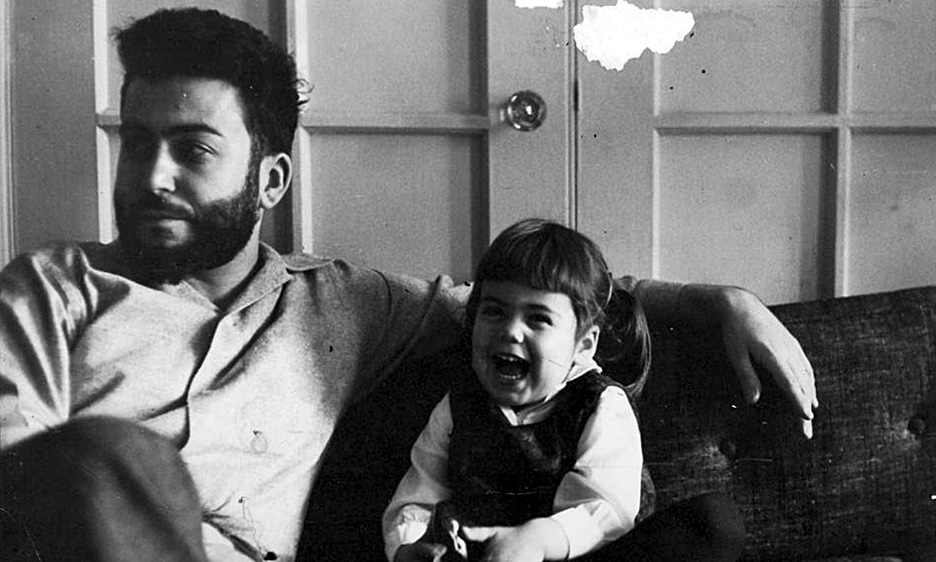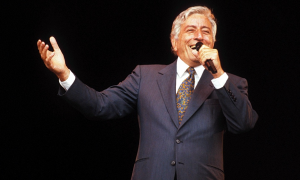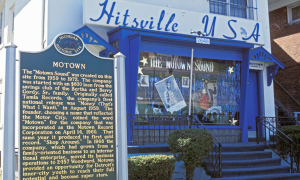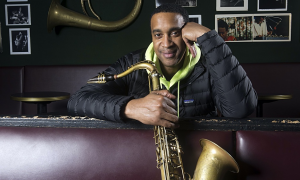Home » Jazz Articles » Beauty, Love and Justice: Living A Coltranian Life » Tender and Fierce Blessings: Malcolm, Coltrane and My Me...
Tender and Fierce Blessings: Malcolm, Coltrane and My Mentor Nat Hentoff

It has been awhile since I wrote. You are heavily on my mind. I must say I miss the ability to reach out to you when I had something magnificent to say about my Kids for Coltrane Project in Education. Sharing other positive news in education such as George Lucas's online magazine Edutopia and the amazing research coming out of Harvard's Project Zero was nourishing. Working out my personal deep frustration with certain aspects of the educational system in New York City with you from 2007 through 2015 was also profoundly life-changing. You always understood and sent me on my way with words of empowerment, enlightenment, and ethics. I was blessed to have you as a mentor. As your great and dear friend John Coltrane was a force for good, so were you. Indeed, I must tell you that the lives you touched while you were here, continue to be elevated and enriched by your love and consideration. Your brilliant body of work certainly impacted me and my students through your courageous and unwavering commitment to beauty, love, and justice.
I attended your memorial service last year at Saint Peter's on the east side of Manhattan with my son. The rooms were filled with people who loved and respected you throughout your unique and dedicated life. I spoke to your daughter Jessica and two of your grandchildren that evening. There were paintings of some of your best friends in the jazz world covering the walls. Sweet conversation flowed with memories of knowing you. I gravitated to the paintings of John Coltrane. I stood by them while we waited to be ushered into the church. The paintings were created by Victor Kalin. I was excited when I saw them as I remembered a deep conversation I had with the artist's daughter Rebecca a few years ago. She told me how much John meant to her dad. It seems this message repeats itself as I meet more and more people through my Coltranian experiences. I hear many narratives in which people state John Coltrane and his music uplifted their lives, so I was moved to see Kalin's work at your Memorial service. As you know, Kalin is the artist who created the portrait of John which is in the inside cover of A Love Supreme.
In my view, John Coltrane brought the protection of the divine and message of A Love Supreme for people all over the world. He preached through his extraordinary music. Tears welled up in my eyes when Jessica told those in attendance that my work with the Kids for Coltrane brought joy to your life! You always encouraged the work which focuses on jazz to teach children about American history, equality, character education and the Arts. By doing this, children become invested in literacy, creativity, compassion, curiosity, and courage. I think you really valued that the program celebrated the individual while also working in collaboration with others. You kept the flame alive, and your spirit pushes me to continue. Something else was stated that evening that blew my mind and touched me to my core. Your two daughters told the mourners what transpired the weeks before you passed with Grace. It still takes my breath away when I think about it, and has enabled me to write this letter which others will read during Black History Month.
I know that you lived a vibrant life as an atheist. You stated this publicly and told me as well. We discussed John's belief in God throughout our talks, and your personal view of a higher power existing was otherwise. It was clear that the difference in this area between the two of you made no difference in your admiration and respect for one another. And then that evening at Saint Peter's the astonishing words uttered by your family, with a song sung by your granddaughter Ruby who was accompanied by your daughter Miranda on piano told what transpired artistically. Your sweet and generous loved ones shared a personal divine miracle with all of us. Weeks before your passing you had three dreams in which God came to you. The message was to accept and believe in Him and before you passed you did embrace a belief in a higher power.
Nat, jazz music and its profound teachings help me get through each day as it did for you as well. You wrote that Charles Mingus once told you most people do create their own slavery, do spend their working time at being smaller than they could be. You always encouraged people including me to live uniquely and fully. Remembering that you told me Duke Ellington's song, "I Know What I Am Here For" related to my laser focus on my work in education, gives me oxygen in the rain. You stated I absolutely knew what I was here for.
Although Trane said he plays Trane, and was not fond of labels, the broad category which is called jazz, is indeed a source of raw truth. You wrote that "Jazz is a continual autobiography, or rather a continuum of intersecting autobiographies, one's own and those of the musicians with whom one plays." Coltrane told us that it is the whole question of life itself. You also wrote, "John Coltrane, for instance, was perpetually examining and reexamining his life; and since there was no division between his music and his life, the recordings he has left-and the memories of his live performances-are a fascinating odyssey of perhaps the most philosophical (in music, not in words) of all the jazz musicians so far." So, the treasure stays with me as your fortified spirit and brilliance empower, and I am guided by and learn from other Coltranian human beings as well.
Nat, your dedication to educating people about the Constitution of the United States of America and the importance of understanding the Bill of Rights will always be part of your legacy. I have been thinking of the First Amendment heavily in the last few months, and I know you would be very concerned with the present political environment. I know you believed deeply in free speech. It is disconcerting to me to hear racist sentiments spewing up more and more in our current social and political atmosphere. I know you believed when people are allowed to speak their beliefs that is how we can get at the truth in a democracy. This political rhetoric is quite challenging to me. The children are listening. Is this the standard they will learn from? Will it make them demand more from our country? Will they dig deeper and develop critical thinking and a democratic fight back or live in a world that becomes fascist? Your fight against racism and prejudice of all kinds is the foundation of your service to humanity. One of my favorite Wall Street Journal articles written by you is "How Jazz Helped Hasten the Civil-Rights Movement."
Nat the love you have for children of the United States of America and the battle against certain stifling elements in the educational system are part of what brought our lives together. Indeed, one has only to read your 1966 book Our Children Are Dying to know this is part of your legacy. What are the children being exposed to in 2018 America when they must hear the battling and hypocrisy from the leadership of our country? What will the young have to compare it to if this is what they know to be a standard at such a tender age? I remember your book was an eye-opening journey which you took with the principal, Elliott Shapiro, and his students attending Public School 119. In fact, you were present when the students received a visit from civil rights leader and award-winning thespian Ossie Davis. As he walked around the school with you he assessed a need for all black children to learn their grand culture all through the year. He stated, "First you need knowledge of and pride in your own culture. And then you go on to discover that at the core of every distinct culture are the common imperatives of all men." Principal Shapiro wrote a paper for educators on this vital topic. He stated, "The history of Africa's earlier civilization has been virtually omitted from textbooks and curricula of schools at every level from elementary to college, everywhere in the world." It was clear he felt Africa did not get its due in our school curriculum.
We can all ask why the curriculum was so limited in this area and still is. I shudder when I remember the words of writer and civil rights activist James Baldwin on education. He answered a question posed to him about public education specifically in reference to black children. Baldwin's response to a question about education in the United States was, ..."You can't talk just about schools, you know they're talking about cities and the cities are in the hands of financiers... and education is a billion- dollar industry and the least important part of an industry is a child. I think this is criminal but this is the way it works. Now the public education in the city in which I grew up you know is enough to break the heart... and when we try, and again we try it over and over and over again to educate our children ourselves, to be responsible for the teaching this curriculum, for the books. We did that for three years in New York some years ago and the experiment succeeded...and because it succeeded it was crashed, it was smashed by the Board of Education, the Teachers' Union, and Albany. You know so that's what you're up against..."
The capitalist system itself has produced a series of rewards and punishments for students, teachers, schools and the institutions that train educators. We discover as the veil moves from our eyes that the nation state is moralizing ignorance to achieve the goals of the capitalist structure, this may be intentional or through untended consequences. Whatever, the answer we must do better for our children and the future of this country. By bringing this into view for our own journeys in education we can grapple with the questions of happiness and freedom. By examining structures in place like standardized testing and a flat curriculum one wonders is this all leading to terminal reality fostering the ideals, views, and mission of the nation state and not what the Greek call eudaimonia which is flourishing happiness and paideia which is deep education. Ultimately, educators must find a way through the darkness by touching souls. We must bring to our youth paths to happiness, and unsettling education to help foster a world in which students examine their lives courageously.
Nat, I was thinking about your bond to Malcolm X. He is heavily on the minds of many especially during Black History Month and the 53rd anniversary of his assassination. I remember the stories you told in reference to your connection to him. You also wrote about him in your book Speaking Freely. Malcolm trusted you! He wrote the following to you on the way back home to the United States from Mecca, "In my recent travels into the African countries and others, I was impressed by the importance of having a working unity among all peoples, black as well as white. But the only way this is going to be brought about is that the black ones have to be in unity first."
Brilliant Malcolm, his courageous evolution from childhood in a racist society to a magnificent leader who touched people locally, nationally and internationally must be told with clear intentions. He grew into a man who could help heal the world, but he was cut down too soon. Due to his charismatic, intellectual and spiritual gifts as a leader, he was maligned and aspects of his narrative were frozen in time by people in power and fear. His story was told with a focus on his anger, but the details of his illuminating journey through righteous indignation and a growing deep love for the human race was not shared widely with the people after his death, especially the children. Perhaps it was his willingness and ability to continue to understand, question, and formulate higher levels of consciousness that added to his premature horrific demise.
If knowledge is power, his force for good was stopped tragically to block his enormous momentum. You write, "All that intelligence, energy, passion, and capacity for evolving leadership-gone. In the years since, I have often thought of what might have been if Malcolm had been alive-organizing, analyzing, and teaching." My hope is that more people research the truth about this man who you had a great respect for. Malcolm understood the value of empowering children with understanding their culture connected to other cultures all over the world. You said he was a tender man. You also said he was a dangerous man. I understand the kind of danger you were referencing. It was his willingness to live and die for humanity as he died his own death daily in his evolution. You lost a dear friend on February 21, 1965, and the world lost a human treasure, but like with Coltrane's teachings through his music, Malcolm's messages are still here with us. It is up to the people of this extraordinary nation to continue to learn from our great heroes who sacrificed dearly for our human rights.
This week as we remember Malcolm's tragic assassination, we also cherish the gifts brought to us by the black culture in America wrapped in A Love Supreme. I reflect more on the journey of Malcolm. A black child raised in the Jim Crow era with his parents dedicated to helping the black race find freedom and justice. This was a time in American history in which black people were being terrorized. Young Malcolm's father was murdered and the body was found severed under a train. What heartache for his family! His precious mother forced to support her children in a desperate situation. She is eventually hospitalized for over twenty years rooted in this trauma!
Malcolm is placed in foster care. He succeeds in school even with the pain and rises a young leader in a predominately white school. In his youth, he thinks about becoming a lawyer but is harshly told by a teacher that someone of his race should not think about that professional option. With his parents gone, and his family home life broken up, his heart is filled with the loss and pain. I am stating this as I imagine how painful it must be for this young genius to wrap his mind and heart around a country that disrespected and terrorized his people. Over time he finds himself in trouble with the law when he moves to a big city. Malcolm finds his punishment and is incarcerated. In prison, he discovers and follows the Black Muslim movement with a deep belief in God. Malcolm emerges as a majestic leader, and over time continues to die in order to learn how to live. That is the goal isn't it Nat? For all of us, we try to dig in and digest what life puts in our path and transforms even while experiences include pain and suffering. How many of us can say we could rise as high as the great Malcolm X? He rises and continues his rebirth as the lessons become clearer and his quest becomes one of brotherhood and sisterhood globally as he embraces the orthodox Muslim religion. Malcolm continued his calling until he took his last breath on earth bringing people of all colors together but never forgetting the deep love he had for his people. Question for you Nat...Why is Malcolm's entire story not told in schools? You knew he was an American hero, but it is only in recent years people of all colors are seeing clearer who this man was. His transformative life is to be celebrated as we celebrate our John Coltrane.
It is always beautiful to remember or learn about the Black Arts Movement of the '60s and '70s which was a renaissance. The Black Arts Movement referenced a John Coltrane and Malcolm X Express, with gifted black artists resurrecting the work and brilliance of these two legends after their early deaths. Nat, why is it taking our country so long to include Trane and Malcolm in our children's history books with the depth and respect they deserve? In the radio documentary Tell Me How Long Trane Has Been Gone, created by Steve Rowland the musicians, writers, and intellectuals express John Coltrane's music as fire music and connections are made to Malcolm's spirit and artistic spoken word. John Coltrane was a spiritual and cultural force through his music. In both of these giants, there is search and struggle which brought about transcendence. Coltrane did see Malcolm speak in Harlem and stated that he was very impressed with him. Writer and civil rights activist Amiri Baraka recognized a connection between black art and political protest. In Manning Marable's book Malcolm X, Baraka described Coltrane as "the Malcolm in the New Super Bop Fire."
In the Rowland radio documentary, Dr. Cornel West states in reference to John Coltrane, "He was able to lay bare the inner troubles and struggles of his own soul in light of this dialectal interplay of these different musical traditions. That is why I think in the end he is so much more than just an artist. He is really a spiritual figure and a cultural figure, in part because of the depths of his honesty and sincerity, laying bare his soul mediated with his artistry, so it was never just a matter of his technical virtuosity. It was always a matter of linking that technical virtuosity to the spiritual wrestling going on." And Nat you state in the radio documentary, that you saw him forlorn at some point, ..."And then not too long afterward there was Trane with his band, with Elvin Jones standing like some kind of spiritual force. It was just one of those stunning experiences. I could not move, I just could not move. So, he didn't just think abstractly about the changes that could happen to somebody if that person found his way, his spiritual way, he knew it existentially as you can know it."
I am forever grateful that you mentored me along with my other mentor the vital prophetic intellectual Dr. Cornel West. I must say it was wonderful introducing you to Cornel at the showing of the film documentary which explored your Coltranian journey. I thoroughly enjoyed viewing, The Pleasure of Being Out of Step. That providential evening in Manhattan watching you and Dr. West come together in discussion will live in my heart, mind, and soul forever. You certainly held one another in high esteem, and the golden vibrations of John Coltrane surrounded us all. By the way, the 25th anniversary of Dr. West's classic book Race Matters was recently released with a powerful new introduction. It is a must-read for the new generation, and reread for the rest of us as we ponder our progress and lack thereof. I continue to read and reread your important books as well.
I remember when you first wrote an article about my work in the Wall Street Journal, "These Kids Think Coltrane is Cool," you stated to me that you thought it would protect me. From what? At the time I did not understand that even the idea of Kids for Coltrane was a radical idea to some. I was teaching literacy, social studies through the arts with love and critical thinking. But you knew that this type of empowering education connected to Coltrane's name for children across the board would be a threat to some. You also knew its extreme value in changing schools powerfully for the better. You wrote about my Kids for Coltrane work in your book At the Jazz Band Ball: Sixty Years on the Scene. You told me that you put the work in the last chapter as it gave you hope for the future.
Nat, you witnessed administrators trying to stop the progress of this work which was soaring, you saw bad forces coming before I did, and sadly dear Nat that narrow-minded negativity occurred both in a public school and private school. Blissfully we also saw the forces for good embrace this work in honor of Coltrane and children. How do we solve the color line chasm if there are pockets of powerful people in our educational system who block human rights and justice for all? The ignorance we are left with is still a danger to a democratic way of life. I wish you were here to help me and others navigate some of what is going on in this world recently. I know you too would be appalled.
We must examine what it is to be human and explore our individual roles as we continue to pursue our callings. The pedological struggles are rooted in the political, economic and social forces, and I would say the sounds of jazz capture it all. To paraphrase Dr. Cornel West, educators must be a hope not just have hope. This can be daunting at times, as for most teachers our calling is also our livelihood. And yet, to find the light in the dark labyrinth we must get out of the cave by carving a pedological path that makes sense to us and courageously speaks to our own moral fiber. This is indeed creating revolutionary schema if we are to change the world. I call this living a Coltranian life. I believe this should be explored in think-tank discussion groups in all schools. Great educators must freely wrestle with their field of education, and dive deeply into being true to their exalted vocation.
Nat, your life lived committed to your ethics and dedication to the people of our country is exquisite. You lived challenging people to remove blind spots in their thinking, and learned from the best passionate people especially the jazz musicians. In your book Boston Boy, you lay out the story of your early life brilliantly. It was during those days in your youth that you connected your Jewish culture and the songs of the cantors to what moved you deeply when you heard the suffering, triumph, and love in jazz. There is no doubt that your earned and trusted friendships with many of the legendary jazz musicians guided you in following your own path with courage, conviction, and absolutism. I remember I told you that I hoped one day you would receive the Pulitzer Prize. I am proud to say that you did accept the Kids for Coltrane Humanitarian Award with great joy, a smile and that Hentoff style.
I leave you with these parting words until I write again...
"Congress shall make no law respecting an establishment of religion, or prohibiting the free exercise thereof, or abridging the freedom of speech, or of the press; or the right of the people peaceably to assemble, and to petition the Government for a redress of grievances." -The Bill of Rights-First Amendment
With eternal respect and gratitude,
Christine
Tags
PREVIOUS / NEXT
Support All About Jazz
 All About Jazz has been a pillar of jazz since 1995, championing it as an art form and, more importantly, supporting the musicians who make it. Our enduring commitment has made "AAJ" one of the most culturally important websites of its kind, read by hundreds of thousands of fans, musicians and industry figures every month.
All About Jazz has been a pillar of jazz since 1995, championing it as an art form and, more importantly, supporting the musicians who make it. Our enduring commitment has made "AAJ" one of the most culturally important websites of its kind, read by hundreds of thousands of fans, musicians and industry figures every month.

























